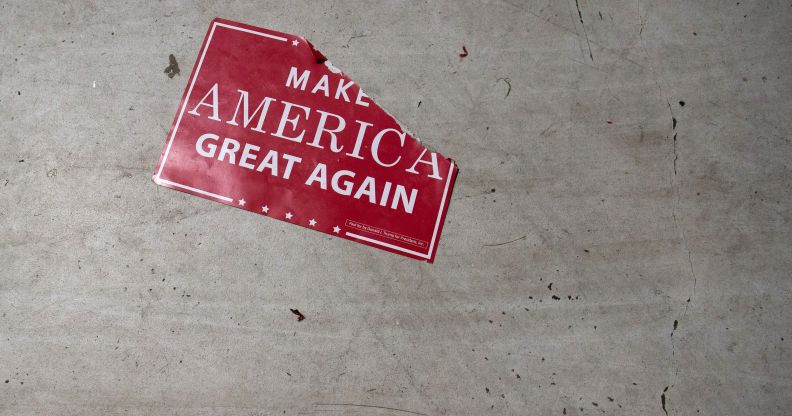Majority of Republican voters support the equality laws their own party is blocking

A ‘Make America Great Again; sign sits on the floor following a Republican rally on October 24, 2018. (SAUL LOEB/AFP/Getty)
A majority of Republican voters support anti-discrimination protections that their own party is blocking.
There is currently no federal US law prohibiting discrimination against LGBT people – meaning it is still legal to fire someone for being gay in 33 of the 50 US states.
A bill known as the Equality Act – which would outlaw discrimination and ensure a range of protections for LGBT people – was tabled by Democrats in Congress last year.
However, it has made little progress as Republicans currently control both Houses – and just one Republican lawmaker has come out in favour of the legislation.
New polling released this week shows that despite the opposition to the measure among Republican lawmakers, Republican voters overwhelmingly support it.

The Public Religion Research Institute carried out polling on the issue for the 2015 American Values Atlas – and found that 61 percent of Republican voters back laws that would protect gay, lesbian, bisexual, and transgender people from discrimination in jobs, housing, and public accommodation.
71 percent of Americans support the laws in total – and 78 percent of Democrats.
Surprisingly, the poll also found that a majority of the people who oppose equal marriage support nondiscrimination legislation.
49 percent of people who don’t support same-sex marriage believe that gay people should still be protected from discrimination – with just 45 percent in favour.
Supporters of same-sex marriage near-unanimously also support legislation protecting LGBT people from discrimination.

Somewhat less surprisingly, there is less support for nondiscrimination legislation in Deep South states than in the country’s urban centres.
Support is higher in the Northeast (76 percent) and West (75 percent), and lower in the South (66 percent) and Midwest (71 percent).

Residents of New England states such as Rhode Island (84 percent) and Massachusetts (83 percent) are the most supportive of these laws, while residents of Deep South states, such as Mississippi (54 percent), Alabama (57 percent), and Arkansas (57 percent), are the least supportive.
Support for LGBT nondiscrimination legislation is also higher among Asians and Hispanics, and lower among Whites and African-Americans.

Polling specifically on ‘religious freedom’ elements, the PPRI adds: “Americans are broadly opposed to allowing small business owners to refuse to provide products or services to gay or lesbian people if doing so violates their religious beliefs.
“Overall, nearly six in ten (59%) Americans oppose allowing these religiously based service refusals, while 35% favour them.”
“Unsurprisingly, Democrats are significantly more likely than Republicans to oppose allowing small business owners to refuse products or services to gay or lesbian people if doing so violates their religious beliefs.
“Nearly three-quarters (74%) of Democrats oppose allowing small business owners to refuse to provide products or services to gay or lesbian customers on religious grounds, compared to four in ten (40%) Republicans. A majority (55%) of Republicans favour allowing religiously based service refusals.”
However, it adds that the party is increasingly split, explaining: “While more than six in ten (63%) conservative Republicans favour allowing small business owners to refuse service to gay or lesbian people on religious grounds, moderate and liberal Republicans disagree.
“A majority (53%) of moderate Republicans and nearly two-thirds (64%) of liberal Republicans oppose allowing religiously based service refusals.”
David Stacy of the Human Rights Campaign: “It’s long past time for Congress to end a status quo where LGBT people remain at risk in a majority of states of being denied services or fired because of who they are or who they love.
“A majority of Americans agree, whether they are living in red states or blue.
“Americans across the country get it, and understand that everyone should be able to live free from fear of discrimination and be able to have a fair chance to earn a living and provide for their families, including people who are lesbian, gay, bisexual or transgender.”
The Equality Act has won support from Barack Obama, Hillary Clinton, Bernie Sanders and large corporations including Apple – but even purportedly pro-LGBT Republican groups like the Log Cabin Republicans have declined to back it.
Declining to take a stance on the bill, the Log Cabin Republicans claimed it “shares hesitations” with lawmakers who have raised concerns about the impact on religious freedom.
Despite public opinion shifting in favour, the Republican Party appears be even more strongly unified against LGBT rights compared to 2013, when the Employment Non-Discrimination Actcame before Congress.
Though ENDA was ultimately blocked by Republicans, at the time it picked up a handful of Republican co-sponsors – many of whom have since declined to back the vastly-similar Equality Act.
Congressman Bob Dold is the only Republican to support the law, explaining: “Illinois has a long and proud history of fighting for equal rights, and I am proud to continue this tradition by supporting the Equality Act.

“Engraved on the front of the Supreme Court is the phrase ‘equal justice under the law,’ but as long as any Americans can be legally discriminated against, there is not equal justice in this country.
“Congress must act to ensure that all Americans, including the LGBT community, are protected equally from discrimination under federal law, just as they already are in my home state of Illinois.”
He said the bill is “not perfect”, but added: “It marks an important first step in the process of crafting a bipartisan bill that ensures equal rights for all Americans while also fully protecting the religious freedoms our Constitution guarantees.”

